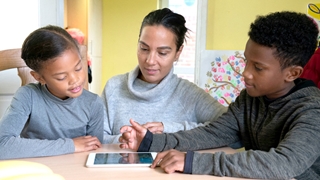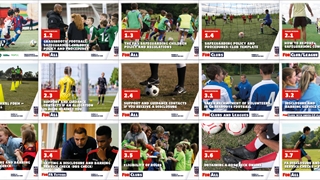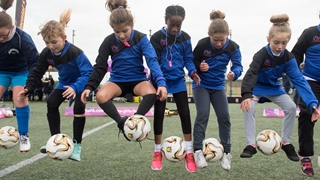
Play safe - Online
At the FA our approach to safeguarding – and our responsibility to keep children safe – applies to the online environment as much as to the offline world.
We know that teams, clubs, and leagues really benefit from online and digital technology. Whether communicating team results or a change of venue, promoting social events, or sharing coaching tips and skills to encourage and support new volunteers – it helps teams and clubs to run effectively and be better connected.
For clubs to benefit safely from the online environment, it is important they follow best practice in social media and technology use. Club officials, match officials and parents/carers involved in football should understand how their safeguarding responsibilities apply online.
We've shared key FA guidance on this below for clubs, players and parents/carers – as well as signposting to other useful sources of information on all aspects of digital safety and wellbeing. We will continue to share advice and good practice on online safety in our training, guidance and communications.
Safer Internet Day 2025
Safer Internet Day 2025 will take place on 11 February 2025, with celebrations and learning based around the theme ‘Too good to be true? Protecting yourself and others from scams online‘
Created in consultation with young people across the UK, this year Safer Internet Day (SID) will be focusing on the issue of scams online and for young people, how to protect themselves and others, as well as what support is available to them.
Find the social media toolkit here
Here are some tips for parents and carers to follow:-
• Keeping you and you loved ones safe online
• Enjoy going online together and talk regularly about your family’s online lives
• Take online security measures seriously
• Look out for warning signs that someone or something online cannot be trusted
• Remember that anyone can be a victim of a scam
• Know where to get help if something goes wrong
You can also complete the free online Safeguarding Awareness for parents and darers here.
You can also find out more information for the following age groups, featuring tips on the top scams to look out for.
7-11 years,11-14 years and 14-18 years.
Sue Ravenlaw, FA head of safeguarding, said: “It’s great to be supporting this year’s Safer Internet Day, on 11 February 2025 and promoting their helpful online safety experts’ top tips.
"As the nation’s favourite game grows so too does its digital footprint.
"Most of us are spending more time online, in fan forums, club socials, checking match reports and training schedules, using digital training tools, accessing courses, articles and so much more. Staying safe whilst doing this is essential, so please check out the Safer Internet Day top tips on ‘Protecting yourself and others from scams online’.”









